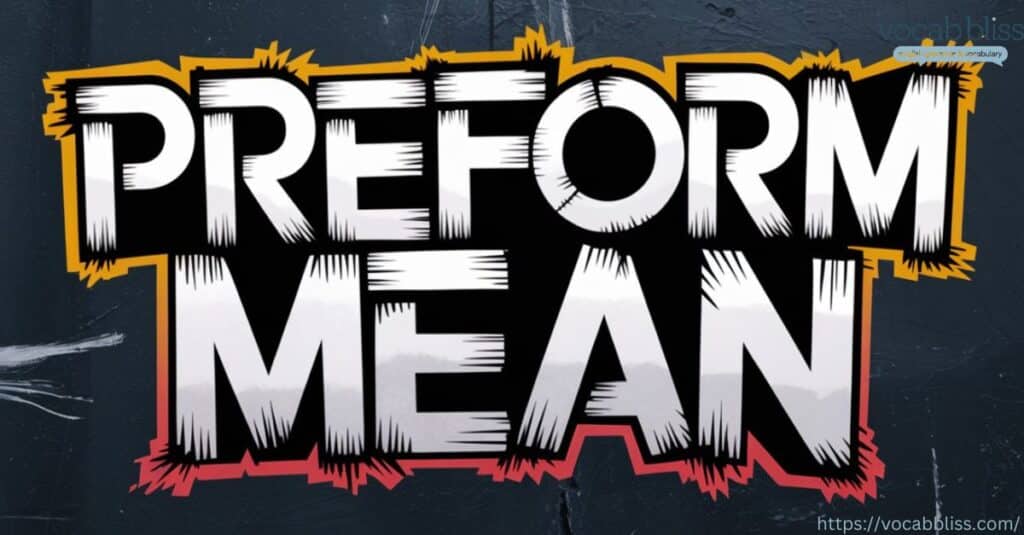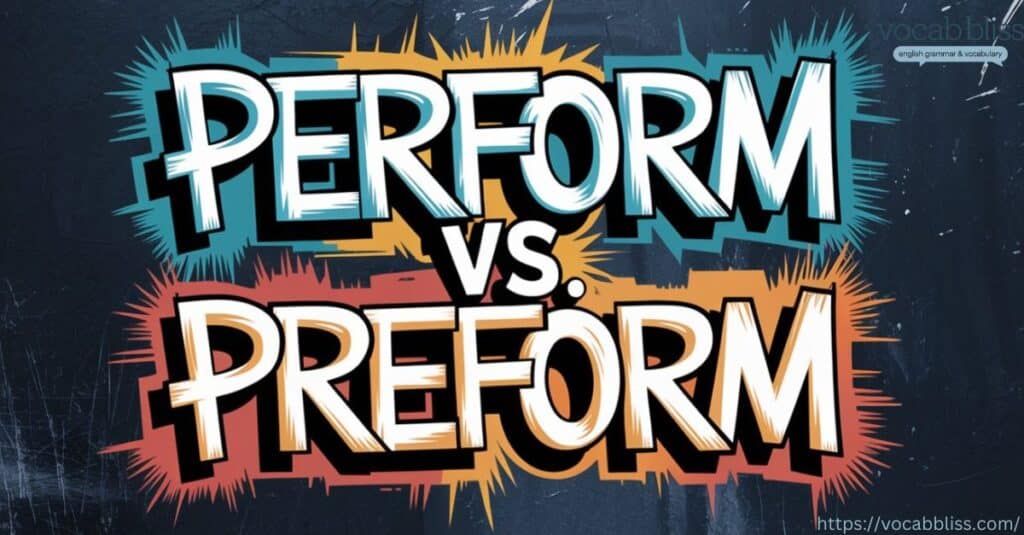Confusion between the words perform vs preform is incredibly common. They look similar, sound almost identical, and yet, they serve distinct purposes in language and action.
This article aims to clear up the difference between perform or preform, so you’ll understand where each term fits best. From everyday tasks to technical manufacturing and performance arts, we’ll dive into the definitions, usages, and common mistakes with these words.
Perform vs Preform: An Overview
Is it preform or perform? Though these words are only a few letters apart, their meanings are worlds apart. Here’s a quick snapshot to grasp their basic differences:
| Word | Definition | Context of Use |
|---|---|---|
| Perform | To carry out an action or task, often with skill | Arts, workplace, task execution, entertainment |
| Preform | To shape or mold a material before final processing | Manufacturing, crafting, engineering |
In essence, “perform” involves doing a task or action, while “preform” refers to shaping or preparing something beforehand.
What Does “Perform” Mean?

Perform is a verb we encounter frequently, especially in settings that require actions or skills to be displayed. Here’s what you need to know:
Definition and Part of Speech
- Perform is a verb that means to carry out, accomplish, or execute a task or duty.
Usage in Real-Life Contexts
“Perform” finds itself at home in various fields, including the arts, professional environments, and technical operations. Let’s look at its versatile applications:
Entertainment and Arts
When actors, singers, or dancers perform on stage, they demonstrate their skills to an audience.
- Example: The actor performed an incredible monologue during the recital.
Professional and Workplace Contexts
In the workplace, performing is all about getting tasks done, whether they’re technical reports, projects, or operations.
-
Example: The employee performed the software analysis with precision.
Academic and Educational Settings
Students are often required to perform complex problem-solving tasks to demonstrate their understanding. They may use the services of mathematics assignment help to ensure they perform every step of a calculation correctly before submitting their work.
-
Example: The student performed the calculus equations with great accuracy.
Medical and Technical Operations
In highly technical or specialized fields, like surgery or software engineering, “perform” implies executing complex procedures that require expertise.
-
Example: The surgeon performed a successful operation.
Synonyms and Related Terms
- Execute
- Carry out
- Accomplish
- Complete
Common Phrases with “Perform”
Some common phrases you might hear include:
- “Perform well” or “perform poorly”
- “Perform to standards”
- “Perform under a contract”
What Does “Preform” Mean?

On the other hand, preform is far more specific in its application and tends to be used in manufacturing, production, and technical fields.
Definition and Part of Speech
- Preform is also a verb (and sometimes a noun) that means to shape or mold something in advance of a later process.
Usage in Specific Contexts
“Preform” applies to settings where materials or objects are shaped beforehand as part of a larger production or crafting process. Below are some typical uses:
Manufacturing and Engineering
In manufacturing, materials are often preformed before final assembly or processing. This could involve shaping plastic, metal, or other materials.
- Example: The metal sheets were preformed before assembly in the production line.
Scientific and Technical Settings
In labs or technical settings, “preform” may refer to the initial shaping of materials for controlled experiments.
- Example: The glass was preformed for optimal precision in the engineering process.
Artisanal and Crafting Applications
Artists and crafters sometimes preform clay or other materials before the final shaping.
- Example: The artisan preformed the clay into a rough shape before final molding.
Synonyms and Related Terms
- Shape
- Form
- Mold
- Pre-shape
Common Phrases with “Preform”
- “Preform a mold”
- “Preform materials”
- “Preformed structure”
Side-by-Side Comparison: Perform vs Preform

Here’s a side-by-side comparison that illustrates the key distinctions:
| Aspect | Perform | Preform |
|---|---|---|
| Action | Carries out a task, shows skills | Shapes or prepares a material beforehand |
| Contexts | Arts, workplace, professional settings | Manufacturing, scientific, and crafting environments |
| Common Phrases | “Perform well,” “Perform duties” | “Preform materials,” “Preform shape” |
| Example Sentences | “They will perform the task on stage.” | “The parts were preformed before final assembly.” |
| Pronunciation | /pərˈfɔːrm/ | /ˈpriːfɔːrm/ |
Memory Tip: If you’re shaping something first, it’s likely “preform.” If you’re doing an action, it’s probably “perform.”
Common Mistakes and How to Avoid Them
Misusing “perform” and “preform” is more common than you might think. Here’s a breakdown of frequent mistakes and tips for avoiding them.
Confusing “Preform” with “Perform”
One of the most frequent errors is using “preform” when “perform” is intended. This usually happens due to typos or a misunderstanding of their meanings.
| Mistake | Correct Usage |
|---|---|
| “I will preform the task.” | “I will perform the task.” |
| “The singer preformed well.” | “The singer performed well.” |
| “Preform a report for class.” | “Perform a report for class.” |
Tip: Double-check any professional communication or formal document where precision matters. Proofreading helps avoid confusion and ensures that you’re conveying the intended meaning.
Overusing “Preform” to Sound Sophisticated
Sometimes, people use “preform” instead of “perform” to sound more refined, but this leads to errors, especially when discussing actions or tasks. Keep it simple—use “perform” for activities and “preform” for shaping objects or materials.
The Evolution of “Perform” and “Preform”

It’s fascinating to see how language adapts over time. While “perform” has been used in English for centuries, especially in arts and formal tasks, “preform” is a relatively modern term. It emerged with advances in manufacturing and production processes, where creating parts or objects in a predefined shape became necessary.
Practical Applications Across Industries
Understanding how “perform” and “preform” are used across different industries can help clarify their distinct meanings.
| Industry | Perform Usage | Preform Usage |
|---|---|---|
| Theater | Actors perform roles on stage. | Costume designers use preformed elements for costumes. |
| Sports | Athletes perform in competitions. | Equipment manufacturers preform protective gear. |
| Music | Musicians perform in concerts. | Instrument makers preform wooden parts for consistency. |
| Education | Students perform experiments in labs. | Teachers use preformed lesson templates for courses. |
| Healthcare | Surgeons perform life-saving operations. | Medical device companies preform implants. |
| Technology | Software performs various functions. | Hardware components include preformed circuit boards. |
| Construction | Workers perform building and repairs. | Architects use preformed building components. |
| Automotive | Cars perform on test tracks for quality. | Manufacturers preform body panels before assembly. |
| Fashion | Models perform on the runway. | Designers preform fabric for structured garments. |
| Culinary | Chefs perform advanced cooking techniques. | Food processors preform certain ingredients for products. |
This table clarifies how “perform” and “preform” are applied in real-world contexts, highlighting their distinct applications and meanings.
The Linguistic Landscape: Commonly Confused Word Pairs
The English language is filled with similar-sounding words that carry very different meanings. Perform and preform are just one example of how context shapes word choice. Here are some other commonly confused pairs:
| Word Pair | Similarity | Key Difference |
|---|---|---|
| Perform/Preform | Both imply action | Perform is about execution, Preform is about shaping |
| Affect/Effect | Both relate to influence | Affect is a verb, Effect is usually a noun |
| Complement/Compliment | Both positive in nature | Complement enhances, Compliment praises |
| Precede/Proceed | Both relate to order | Precede means before, Proceed means to continue |
| Imply/Infer | Both about meaning | Imply suggests, Infer deduces |
| Assure/Ensure/Insure | All involve certainty | Assure is to promise, Ensure is to make certain, Insure is for financial protection |
| Elicit/Illicit | Similar Sound | Elicit means to draw out, Illicit means illegal |
| Eminent/Imminent | Both relate to prominence | Eminent means distinguished, Imminent means impending |
| Discreet/Discrete | Both imply separation | Discreet means cautious, Discrete means distinct |
| Principle/Principal | Both relate to importance | Principle is a rule, Principal is the head or main |
Understanding these distinctions helps reinforce correct usage in everyday language, improving clarity and ensuring accuracy.
Everyday Usage Examples

To make things even clearer, let’s look at examples of each word in various settings:
Examples for “Perform”
- Entertainment: The singer will perform her hit song at the concert.
- Professional Context: The employee performed her duties exceptionally well.
- Technical Procedure: The technician performed a software installation.
Examples for “Preform”
- Manufacturing: The plastic parts were preformed to fit specific molds.
- Engineering: The circuit boards were preformed before soldering.
- Crafting: Clay is often preformed before being shaped on a potter’s wheel.
Comparative Examples
- Correct: The actor performed on stage. / Incorrect: The actor preformed on stage.
- Correct: The metal was preformed for assembly. / Incorrect: The metal was performed for assembly.
Performing vs Preforming: Common Errors
preforming vs performing these words can easily be misused, especially in writing. Below are some typical mistakes and helpful tips for avoiding them.
Spelling Confusion
A common error is to use “preforming or performing” is meant, especially in professional or casual writing.
- Incorrect: The musician preformed well last night.
- Correct: The musician performed well last night.
Tips to Avoid Mistakes
- Think about the context: If it’s about shaping, it’s likely “preform.”
- Consider the sentence meaning: If the sentence talks about an action, “perform” is likely correct.
Mnemonics and Memory Tricks
- “Preform” relates to “pre” (meaning “before”) and usually involves shaping materials in advance.
- “Perform” involves action—think of a performance on stage!
Performed vs Preformed: Past Tense Usage
Let’s examine the past tense forms and how they impact meaning of Preformed or Performed
Performed
“Performed” refers to an action completed, such as a recital, task, or job duty.
- Example: She performed her role beautifully during the play.
Preformed
“Preformed” means something was shaped in advance, often referring to materials or parts.
- Example: The metal sheets were preformed to fit the production line.
Explanation of Misuse
Mixing up these terms, especially in past tense, can confuse readers, so double-check your writing!
Conclusion
To wrap up, here’s a quick reference summary to help you remember when to use perform and preform:
- Perform: For actions, tasks, arts, or duties.
- Preform: For shaping, molding, or preparing something beforehand, mainly in manufacturing or technical fields.
With this guide, you should feel confident choosing between “perform” and “preform.” Keep these tips in mind, and don’t hesitate to use this as a quick reference next time you need to perform or preform in your writing!
You Might Also Like:
- Loosing or Losing: Which One Is Correct?
- Simpler or More Simple? How Do They Differ?
- Arial or Aerial? Sorting Out the Differences
- Happened or Happend: Is It This or That?
- Exception vs Exemption: What Sets Them Apart?







